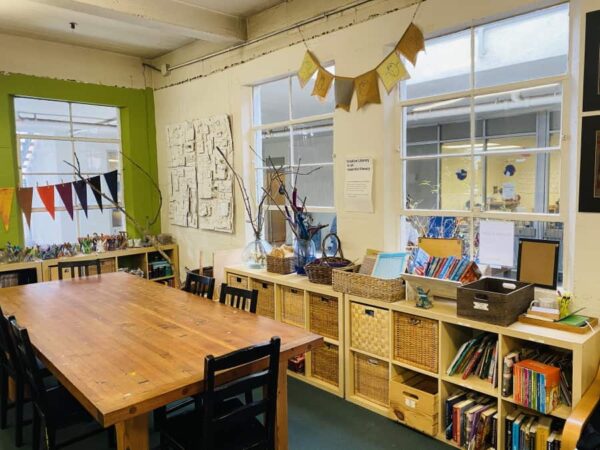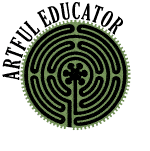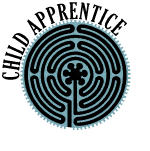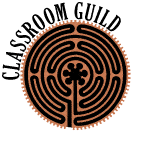Full Time Curriculum
General StructureWaterhouse Guild is a hybrid program that harnesses the exceptional traditions of home-school while providing full-time classes for K through 8th grade.
At the Guild, teachers and the parent community join together to mentor the student apprentices. The Waterhouse Guild utilizes an integrated strategy of individualized Foundations coursework and thought-provoking Explorations seminars and workshops designed to help the child tap into his or her greatest potential and strengths.
Artful Educator
The work of the Guild mentor is to nourish, inspire and encourage academic and personal excellence by providing conditions in which a child’s curiosity will thrive. Harkening back to the Renaissance guild mentorship, the goal of the Artful Educator is to help children cultivate their natural strengths by encouraging them to utilize their strengths and to strengthen their weaknesses. We believe that walking alongside the child apprentice as he or she presses into the important work of becoming educated leads to individual excellence.
Artful Educators are mentors who serve as both a guide and collaborator working alongside the child. Recognizing that each child possesses the potential for genius, the mentor commissions children to discover the potential of their individuality. By presenting authentic tasks and emphasizing discovery, the Artful Educator’s goal is to whet the curiosity of each child apprentice and to spark the creative impulse, thus setting the art of learning into motion.
Beneficial Mentor-Apprentice Ratios
Individualized pacing is directly related to classroom size and so we have limited space to 10 students with one Lead Mentor and one Assistant Mentor, giving the students a 5:1 student-teacher ratio. This translates into more one-to-one time with each child, enabling students to learn at their own pace, and teachers to make individualized academic adjustments.
Ongoing Assessment of Learning
Assessment is a vital tool that the mentor uses to individualize instruction. We keep close track of objective and subjective progress, both for the Foundations and Exploration courses. While Foundations are tracked objectively, we prefer to describe progress in Exploration courses in both narrative and objective terms. The Artful Educator reflects broadly and deeply upon the complexity of children as learners to measure progress along the academic spectrum. Our elementary and middle school apprentices are individually assessed against national norms in reading, writing and math and participate in standardized achievement tests every year.
Child Apprentice
We recognize and respect the rich potential of each child. The environment should match your objectives, Curiosity is the motivator that sparks innovation. Curiosity invites us to imagine possibility. Under the capable and nurturing mentorship of the Artful Educator, the child apprentice will learn to analyze, interpret, and reflect. Children will embrace and engage in the work of becoming educated as they are encouraged to enjoy the pursuit of knowledge and skill and the art of putting these into creative practice. Inside the Classroom Guild, the Child Apprentice will engage over time in a broad scope of meaningful exploration of diverse subject areas and acquire an exceptional network of Habits of Being.
Habits of Being
Learning is an unruly algorithm, a one-step-at-a-time journey with unexpected side strolls. To be exceptional requires sincere practice and rigor that is seated in the heart. Caring about work makes work meaningful. In the same way, the musician practices scales and the artist draws lines, textures, and shapes, The Guild Method helps children discover and develop the skills that will help them successfully press into and accomplish their own long-term meaningful work. It’s true that practice makes perfect. But not all practice develops meaningful outcomes. The right kinds of practice over time build habits of being and Habits of Being make us authentically us.
Multi-age Clusters
Waterhouse Guild has four fluid multi-age clusters: K-2nd, 3rd-5th, and 6th-8th grade. In a multi-age setting, children experience the role of both apprentice and mentor, sometimes learning from other students and at other times teaching students. Children at Waterhouse are encouraged to help each other with their work, creating an organically supportive environment for learners at different stages. Together, these experiences help cement a foundation of collaboration within the community and confidence within each individual.
Classroom Guild
There is a critical link between the learning environment and the way children learn. Inside the Classroom Guild there is order and aesthetic. Teeming with fertile opportunity, the environment welcomes the Child Apprentice to enter peacefully into the work of discovery.
The offerings of the environment are essential, both in terms of human interaction and academic development. For this reason, tools and materials are purposeful and offer practical application. The overall setting and tone of the environment embodies beauty, sophistication, simplicity, and accessibility. Waterhouse Guild utilizes the power of the prepared environment as a virtual mentor.

Longer Learning Periods
Seat-centered academics and the 50-minute learning period is an outdated model, the Guild re-structures the classroom to offer longer learning periods—two to three hour workshops—and the opportunity for longitudinal community and individual investigation of subjects with an emphasis on application to original work.
A full Spectrum of Subjects
The Guild method offers a balanced range of foundational and explorative courses in an environment that allows for learning to occur within a longitudinal perspective.
Beneficial Mentor-Apprentice Ratios
Individualized pacing is directly related to classroom size and so we have limited space to 10 students with one Lead Mentor and one Assistant Mentor, giving the students a 5:1 student-teacher ratio. This translates into more one-to-one time with each child, enabling students to learn at their own pace, and teachers to make individualized academic adjustments.



